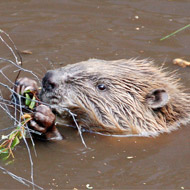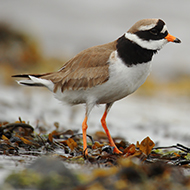The verdict gives the partners the go-ahead to reinforce the existing beaver population in Knapdalr, Argyll.
Decision follows almost 20 years of work
The beaver will be recognised as a native species, 400 years after being hunted to extinction in the UK, the Scottish Government has confirmed.
The decision follows the publication of a report which summarises almost two decades of work on beavers by the Scottish Beaver Trial, the Tayside Beaver Study Group and a host of other projects and initiatives.
Returning beavers to Scotland’s lochs and rivers is the first formal mammal reintroduction in UK history. Two lead partners in the Scottish Beaver Trial - The Royal Zoological Society of Scotland and the Scottish Wildlife Trust - described the decision as ‘a major success story for conservation’.
The verdict gives the partners the go-ahead to reinforce the existing beaver population in Knapdalr, Argyll. It also means that the established population on the River Tay can remain.
However, the partners stress that further releases will be necessary over the next few years in order for the species to have a long-term future in Scotland.
“Returning a keystone species to the wild for the first time in 400 years is a tremendous achievement for RZSS and our partners the Scottish Wildlife Trust, and we welcome the government’s commitment to the species both in Knapdale and further afield,” commented Barbara Smith, chief executive of RZSS.
“Establishing a clear and comprehensive management plan for the species should now be our top priority, drawing upon IUCN best practice guidelines and bringing together stakeholders from across the conservation, land management and farming spectrum.”
Jonathan Hughes, chief executive of the Scottish Wildlife Trust, added: “This is a major milestone for Scotland’s wildlife and the wider conservation movement. Beavers are one of the world’s best natural engineers. Their ability to create new wetlands and restore native woodland is remarkable and improves conditions for a wide range of species including dragonflies, otters and fish."
“The return of beavers also has great potential for education and wildlife tourism," he continued. "We have already seen at Knapdale how their presence is a tremendous draw for visitors from all over the world, which in turn brings social and economic benefits to the rural economy.
“We’re now looking forward to continuing to work with the Scottish Government and partners in the next phase of this initiative. The Scottish Beaver Trial is a textbook example of how to approach the reintroduction of a keystone species that should set the standard for future projects.”
Image (C) Paul Stevenson







 The veterinary mental health charity Vetlife is inviting the veterinary community to join it for a sponsored cold-water dip.
The veterinary mental health charity Vetlife is inviting the veterinary community to join it for a sponsored cold-water dip.
